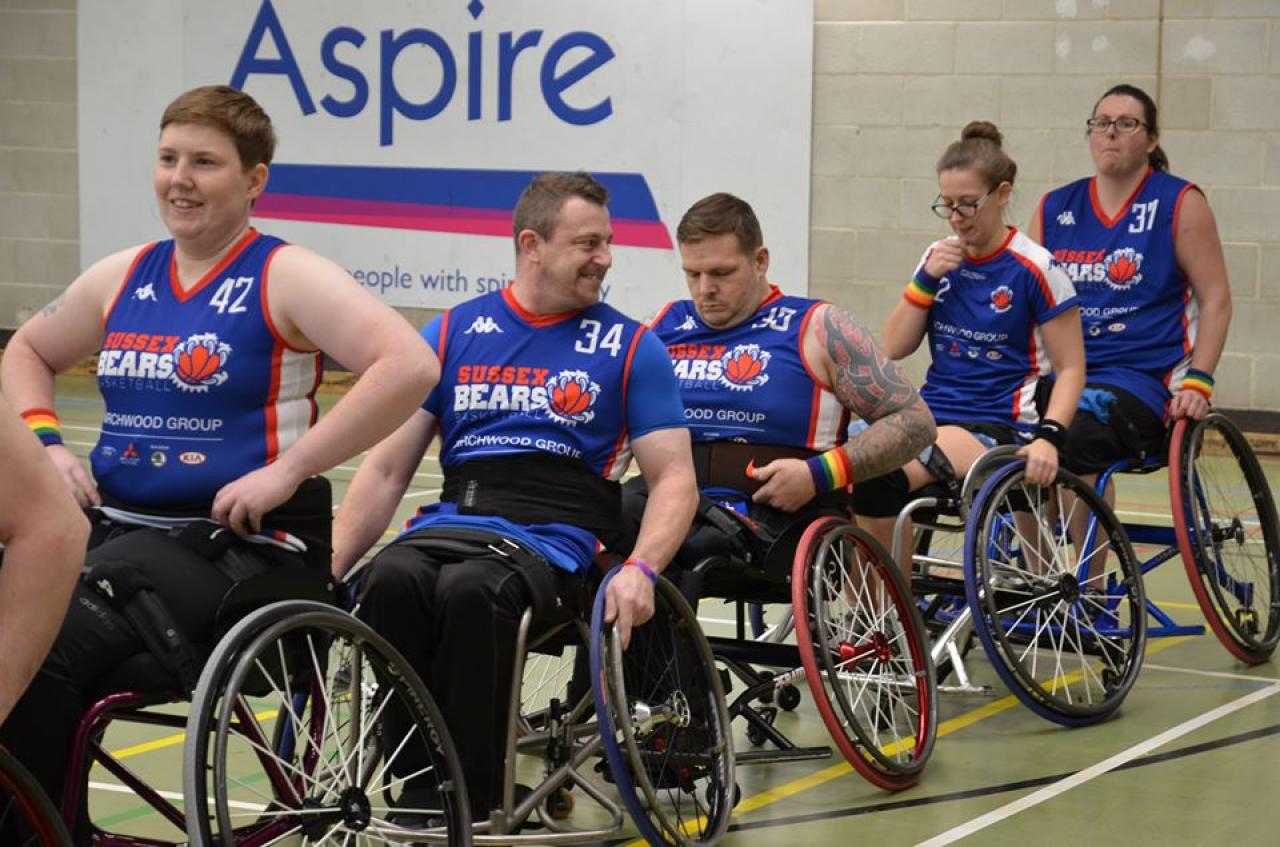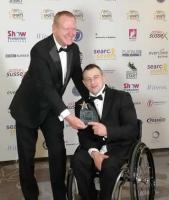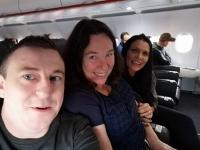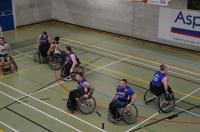
ACTive NGOs met Ricky Perrin (URBACT local group member from Brighton and Hove, UK) in the 3rd Transnational Seminar in Siracusa (IT). Ricky suffered a spinal cord injury in 2006 and is unable to stand up or walk, when we were informed that a person with movement impairment will participate in the meeting, some concerns appeared about a challenge related to rough, paved streets, typical for Siracusa Old Town - Ortigia, which could be quite inconvenient for the person in a wheelchair.
Ricky works closely with his local community in East Brighton and is involved in an active member of several community NGOs. Ricky has lobbied and helped change the physical environment within East Brighton – seeing further dropped curbs that improves accessibility for wheelchair users, families and elderly residents.
Ricky’s community work extends across the wider Sussex region - delivering wheelchair basketball sessions that challenge perceptions of disability. Ricky delivers sessions at schools, to health practitioners, university students and newly qualified teachers as well as setting pop up sessions at East Brighton community venues. Acknowledging his efforts, Ricky was awarded the Active Sussex Volunteer of the Year 2019 award, beating fierce competition to the prize.

ACTive NGOs Brighton Project Coordinator, Tom Goodridge, met with Ricky to find out what community leadership means to him and how the Urbact transfer network has helped him develop further.
Tom: Ricky, what does community leadership mean to you?
Ricky: Bringing out these community leaders that want to…steer the community for the benefit of the community. So instead of being told what’s going to happen in your community, community leaders are the people who have a vision or can talk to the people in the community and help create that community that wants to be, you know, that should be made, as opposed to being told what you can have.
Tom: So community leaders are…drivers of change. They’re not listening, waiting to hear what the change is going to be?
Ricky: Exactly. I think…for a long time most communities feel that they get done to. You know, they get told what they can have and what they cannot have. And a community leader [is] someone who is in touch with what’s going on in the community and then that can act as a bit of a voice for those people.
Tom: So, what do you think the components of a strong community leader are?
Ricky: I would say networking. Networking is the key to anything, you know just talk to people and being good at communicating. Because when you are in a community…you’ve got people from all walks of life. You could have people who are top businessmen and then they could be living next to someone who is disabled, or they could be living next to someone who is, you know, works as a cleaner. And if you’re working as a community leader to being able to talk to all people and to relate to all people and to see things from their side of the street so to speak.
Tom: So that ability to communicate is key?
Ricky: [Yes] and network between people. The community could be so diverse from one end to the other. So how can you relate to a kid of 18/19 and then go and relate to some who is 60 and 70. Unless you’ve got good communication and listening skills and the ability to find common ground between people, I think you go from being either a community leader or a community destroyer very quickly.
Tom: (laughs) I like that phrase
Ricky: you don’t have the ability to… sort of cross the streams with both… you know all parties. You know especially here in Brighton. In Brighton we’ve got a community that’s pretty much people from all over the world. Here in the city of Brighton you’ve got people who come to Brighton from every country on the planet. You’ve got different cultures, different people, different walks of life. People who are very rich live in Brighton and also people who are very poor. So I think it makes the job of being a community leader more difficult but at the same time its more rewarding when you see something good come out of it.
Tom: So for you it’s really important not only to listen but to kind of empathise, to see other people’s situations and reflect on their experiences within the city, within the neighbourhood, within the community they live… because it may not be the same as yours.
Ricky: Exactly. Yeah, you know, you never really know what goes on behind closed doors do you? And if you talk about community in the sense of your neighbourhood, you know I might live in East Brighton and I don’t know what goes on behind people’s doors but when you see people you got to be able to relate to them at face value instead of what they’re doing on that day, how they are and try and look at you know, things from other people’s perspectives.
Tom: Absolutely. How do you think community leaders can make other people within the community feel confident…feel empowered to do things, to make change?
Ricky: You know just because your neighbour down the road is disabled, or unemployed it doesn’t mean their family is going to go down the same route. You know, you can still see people come from a deprived community and then end up being a top businessman or top of their sport or top of their game. I think you need role models that have come through different backgrounds and so that they can go actually - see this guy? He grew up in a deprived neighbourhood and now he’s doing this.
Tom: Or they lived just a street from me and now look what he or she’s achieved. They’ve done this.
Ricky: Yeah exactly.
Tom: So obviously you’ve been part of the ACTive NGOs project for some time now – you have been on a Urbact visit to Siracusa and you’ve been part of the local group (ULG) for some time. How has that affected your local work and promoted and helped develop your community leadership skills.
Ricky: Well I think the Active NGOs, the visit, was an eye opener to see somewhere else. You know I haven’t travelled very much and that’s the first time I’d left the country since I’ve been in a wheelchair.
Tom: I didn’t actually know that.
Ricky: Yeah, that was the first time I’ve been out of the country since then. So it was a different experience for me to actually see how somewhere else operates and lives. I think that the community side of it that I’ve learnt with Urbact has almost come at a perfect time, with what I’m doing with the social enterprise and with the wheelchair basketball. And I think that by combining what I’ve learnt at Urbact with community development, with social enterprise, and with being a social entrepreneur and with trying to get people into disability sport to help them, those three components coming at the same time, is what’s really been a key driver to me pushing on to help more people, both in the community I live in and also the community of people with disabilities.

Tom: Ok so it would it be fair to say [your involvement in ACTive NGOs] has reminded you… to make sure the community element is key within your social enterprise work that you’re doing and the work around disability sports.
Ricky: Exactly. I think the Urbact shows how different community organisations can work together under one roof, like the NGO House and like the buildings that we saw in Siracusa. I think if we take some of the stuff we learnt from there, combine it with some of the stuff that I’m doing with the social enterprise, combine it with the sports and disability sports, what you get is almost like a perfect storm. You are going to get a business that not only serves the community but also has that social impact. So coming into Urbact, coming into the social enterprise and getting into sport, means I’ve learnt those three things over the last two years and so you’ve almost created a wave of knowledge coming in, on both how to help the community, help sports, help the social impact of an enterprise. So it’s like the triple threat.
Tom: I like that, the triple threat. What would be your advice with building relationships and trust in a community?
Ricky: I think it depends. All communities are different. So the first thing is find out what the problems are in a community. You’ll find that a lot of communities have a shared issue or shared problem and if you can get to the root of that, whether it’s poverty or crime or drugs or whatever those common problems are, you’ll probably find half the people you talk to have share that problem. When I lived in the other side of Brighton I lived near a park and just by taking the dog to the park, I found out that no one liked walking through that park at night because the streetlights didn’t work and the notice board didn’t have any glass in. So I contacted the council, I got the streetlights repaired and then I got the notice boards repaired and then I got the pavements repaired. So that when the old people went to the doctor’s surgery on the other side, they could, they wouldn’t fall [over the unstable ground].
Tom: So there’s a one step of observing some of the issues, the problems or the potential, looking on the positive side, and then acting on that and trying to make change?
Ricky: Exactly. It might be something very small but then eventually someone went ‘oh, see that guy Ricky, he’s the guy that got the noticeboard fixed’ or he got pavements repaired or now there’s a drop curb where there wasn’t a drop curb. And those little things start to feed into a community and then next thing you know peoples coming to you going ‘oh have you seen this problem or what do you think of that?’. So it is almost like in any community you need to find a couple of things that are niggling people, [gain] people’s trust, find out where the issues lie and you’ll find that most people have the same issue but most of them don’t talk about it. And unless you are good at communicating to all of the people, people from different walks of life, then suddenly the small problems can get bigger and bigger.
Tom: [One aspect that is spoken about] a lot… within East Brighton, the BN2 Five community is around trust. How do you in your role as a community leader create trust, build trust with other partners within the area?
Ricky: Well me personally, whatever I say I’m going to do I always try and do. It’s just something I’ve already had with me. If I say I’m going to do some wheelchair sports somewhere, I’ll go and do it, I’ll find a way to make it happen. I think when you’re in a community that’s been let down in the past, probably by police or let down by the authorities or the [local municipality] or [central government]. You always feel that they’re on your back and trying to let you down in some way. And I think if you just say well I’m going to do this and then go and do it, you build that trust up.
Tom: So final thing. We…are holding the final [ACTive NGOs transnational] event here in East Brighton. Are you looking forward to 50 and 60 people from the other cities coming across to the UK… showcasing East Brighton at its best?
Ricky: Well obviously I’m going to get them all doing some wheelchair basketball when they come here.
Tom: Fantastic.
Ricky: You know, we’ll get them all in some chairs, doing some balling (get people playing). And it’ll open their eyes, with wheelchair basketball you won’t see a wheelchair as a wheelchair, you’ll see it as a tool for playing a sport. Like you need a canoe to go canoeing you’ll need this, a sports wheelchair, to play wheelchair basketball. And they’ll leave with not only a knowledge of East Brighton but also a knowledge of what it’s like to be in a disabled community. And they’ll probably go away going ‘oh well we should have had a drop curb here or how will that wheelchair get there’.
Tom: Fantastic. Ricky, it’s been a pleasure. Thank you very much.
Ricky: As always, you know me, whatever you need!


